八年级下英语第一单元教案
八年级英语(下)第1单元第一课时教案
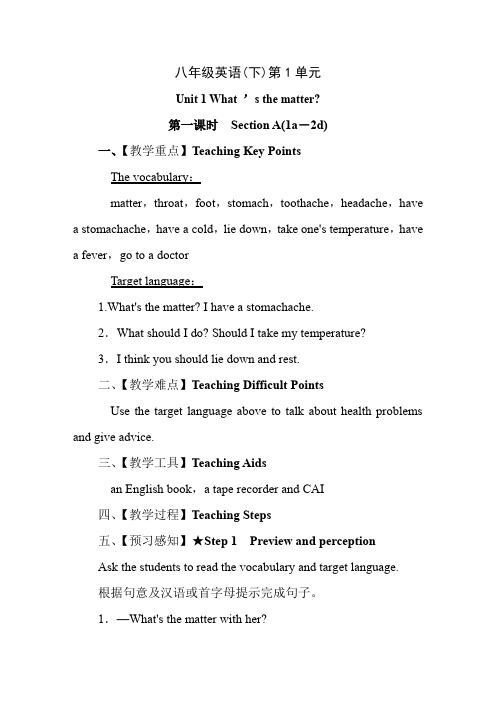
八年级英语(下)第1单元Unit 1 What ’s the matter?第一课时Section A(1a-2d)一、【教学重点】Teaching Key PointsThe vocabulary:matter,throat,foot,stomach,toothache,headache,have a stomachache,have a cold,lie down,take one's temperature,have a fever,go to a doctorTarget language:1.What's the matter? I have a stomachache.2.What should I do? Should I take my temperature?3.I think you should lie down and rest.二、【教学难点】Teaching Difficult PointsUse the target language above to talk about health problems and give advice.三、【教学工具】Teaching Aidsan English book,a tape recorder and CAI四、【教学过程】Teaching Steps五、【预习感知】★Step 1Preview and perceptionAsk the students to read the vocabulary and target language.根据句意及汉语或首字母提示完成句子。
1.—What's the matter with her?—She has a very sore t______ now.2.He ate too much,so he had a s______.3.If you feel tired,you should l______ down and rest.4.If you ______(咳嗽),drink some hot tea with honey.5.He wants to see a dentist,because he has a ______(牙疼).★Step 2Consociation and exploration【合作探究】Let the students read the book by themselves in order to find out the answers.They can discuss the questions in groups or ask the teacher for help.When they finish the questions,ask some students to check the answers.★Step 3Leading in【情景导入】Ask a student to act something is wrong with his/ her head…And T:What's the matter?Help the students to answer:I have a…Have the students repeat.★Step 4Pre-task【准备任务】Page 1,1a &1b1.Look at the picture.Write the correct letter [a-m] for each part of the body.2.Match each activity.3.Play the tape and ask the students to listen and find the answers.Page 1,1c1.Focus on the conversation in the box.2.Practice reading.3.Pairwork:Ask the students to look at the picture and practice in pairs like this:S1:What's the matter?S2:I have…4.Groupwork: Divide the class into some groups.Make conversations.S1:What's the matter?S2:She talked too much yesterday and didn't drink enough water.She has a very sore throat now.S3:…★Step 5While-task【过程任务】Page 2,2a&2b1.Play the recording for the first time.Students listen and number the pictures [1-5] in order.2.Check the answers.3.Play the recording a second time and say:There are five conversations.Some have some problems and the others give them some advice.Listen and match the problems with the advice.★Step 6Post-task【后续任务】Page 2,2c & 2d1.Focus on the conversation in 2c & 2d.2.Practice reading.Make the students scan the conversations first.3.Teach and then make the students role-play the conversation in pairs.4.Play the recording and ask the students to listen and repeat 2d.★Step 7Consolidation practice【巩固练习】Look at the students' book of the 1st exercise.★Step 8Summary【课堂小结】In this class we should master “matter,stomach,toothache,headache,have a stomachache,have a cold,take one's temperature”and some sentences in target language.★Step 9Homework【家庭作业】1.Listen to the tapes twice.2.Practice the conversation on Page 2,2d.Board Design板书设计Unit 1What's the matter?The first period Section A(1a-2d)1.Key vocabulary:have a stomachache;have a cold; lie down;take one's temperature;have a fever;go to a doctor2.Target language:(1)What's the matter? I have a stomachache.(2)What should I do? Should I take my temperature?(3)I think you should lie down and rest.。
人教版英语八年级下册unit1全单元教案
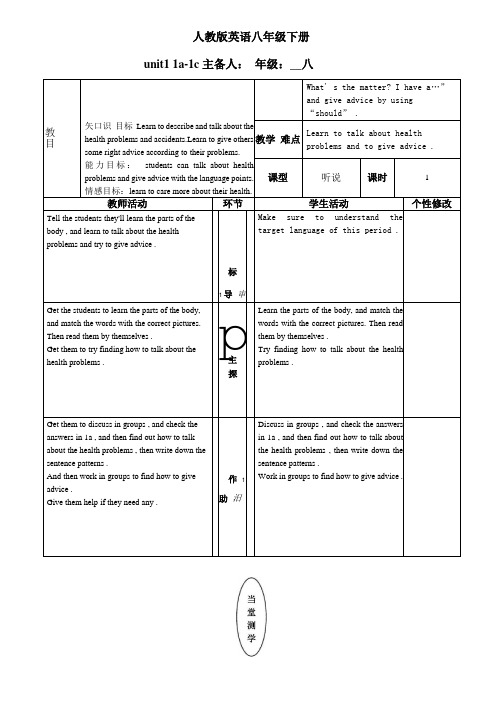
人教版英语八年级下册unit1 1a-1c 主备人:年级:__八学生课堂学习情况反馈教学反思学标教目矢口识目标Learn to describe and talk about the health problems and accidents.Learn to give others some right advice according to their problems.能力目标:students can talk about health problems and give advice with the language points.情感目标:learn to care more about their health.教师活动环节First have a dictation of the new words learned yesterday.Tell them they'll continue to learn how to talk about health problems and give advice .小标导J 审Ask the students to guess what 's the matter with the students in 2a .Then try to find the advice to differentproblems .Get them to translate the phrases . G 主探Play the recording and get them to finish 2a and 2b .Ask them to make conversations according to the listening material .1A作助 1审鬻What' s the matter? I have a…”and give advice by using“should” .教学难点Learn to talk about healthproblems and to give advice .课型听说课时 2学生活动个性修改Have a dictation of the new wordslearned yesterday.Go over the points learned yesterday .Guess what 's the matter with the studentsin 2a and write down .Find the advice to different problems .Translate the phrases .Finish 2a and 2b .Make conversations according to thelistening material .学生课堂学习情况反馈教学反思学科英语课题《unitl 2d , 4b》主备人:年级:__八学标教目知识目标:Learn to give others some right advice according to their problems.能力目标:Enable students to talk about health problems and give advice with the language points.情感目标:Students care more about themselves and their family members ' health.教师活动环节Tell them that they'll continue to learn how totalk about health problems and give advice.Today they'll learn a conversation and talkabout health problems.标1导刘Ask the students to read the dialogue bythemselves , underline the new words and thewords they don't know.Get them to answer the questions given by the teachers. G 主探Get them to work together and find out theanswers according to the conversation. Then role play the conversations. A作助旧教学重点Learn to talk about healthproblems by using “What' s thematter? I have a …” and giveadvice by using “should”.教学难点Learn to give appropriate adviceto the certain health problems.课型听说课时 3学生活动个性修改Continue to learn how to talk abouthealth problems and give advice.Learn a conversation and talk about health problems.Read the dialogue by themselves ,underline the new words and the wordsthey don't know.Answer the questions given by theteachers.work together and find out the answersaccording to the conversation.Then role play the conversations.学生课堂学习情况反馈教学反思学科英语课题《unit 1 grammar-4b》主备人:年级:_八学科英语课题《unitl section B 1a- 1c》主备人:年级:_八教学资源(含自编习题、阅读文章、听力资料、知识链接等)学科英语课题《unitl section B 2b-2e》主备人:_年级:_八学科英语课题《unitl self check》主备人:_年级:_八__。
译林版英语八年级下册第一单元全套优质教案

译林版英语八年级下册第一单元全套优质教案一、教学内容1. Reading: A visit to the United Kingdom2. Grammar: Present Perfect Tense3. Listening and speaking: Then and now4. Writing: A letter about changes二、教学目标1. 能够理解并运用一般过去时和现在完成时描述过去和现在的变化。
2. 能够通过听力、口语、阅读和写作活动,了解英国的历史和文化。
3. 培养学生的跨文化交际意识,提高他们的英语综合运用能力。
三、教学难点与重点1. 教学难点:现在完成时的构成和用法,以及一般过去时和现在完成时的区别。
2. 教学重点:熟练运用一般过去时和现在完成时进行句子描述,以及了解英国的历史和文化。
四、教具与学具准备1. 教具:PPT、录音机、图片、卡片等。
2. 学具:课本、练习本、字典等。
五、教学过程1. 引入:通过展示英国著名景点的图片,引导学生谈论自己对这些景点的了解,激发学生的学习兴趣。
2. 阅读环节:学生阅读课文,了解英国的历史和文化。
教师针对课文内容提问,检查学生的理解程度。
3. 语法环节:讲解现在完成时的构成和用法,结合例句进行解释,让学生进行随堂练习。
4. 听说环节:学生听录音,完成听力练习。
教师引导学生进行口语交流,运用一般过去时和现在完成时描述过去和现在的变化。
5. 写作环节:教师示范如何写一封关于变化的信,学生根据模板进行仿写。
6. 小组活动:学生分组,讨论并分享彼此的了解,然后向全班展示。
六、板书设计1. Past and Present2. 内容:a. 一般过去时和现在完成时的构成和用法b. 英国历史和文化要点c. 写作模板:关于变化的信七、作业设计1. 作业题目:a. 根据所给图片,运用一般过去时和现在完成时描述变化。
b. 写一封关于自己家乡变化的信。
人教版八年级下册英语教案unit1
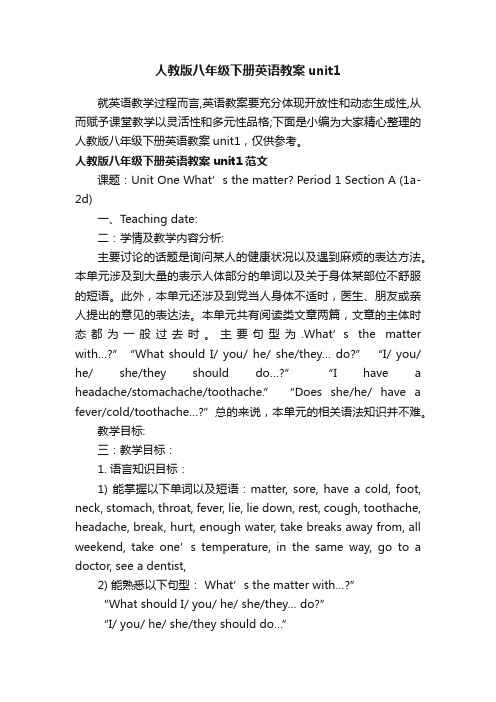
人教版八年级下册英语教案unit1就英语教学过程而言,英语教案要充分体现开放性和动态生成性,从而赋予课堂教学以灵活性和多元性品格;下面是小编为大家精心整理的人教版八年级下册英语教案unit1,仅供参考。
人教版八年级下册英语教案unit1范文课题:Unit One What’s the matter? Period 1 Section A (1a-2d)一、Teaching date:二:学情及教学内容分析:主要讨论的话题是询问某人的健康状况以及遇到麻烦的表达方法。
本单元涉及到大量的表示人体部分的单词以及关于身体某部位不舒服的短语。
此外,本单元还涉及到党当人身体不适时,医生、朋友或亲人提出的意见的表达法。
本单元共有阅读类文章两篇,文章的主体时态都为一般过去时。
主要句型为.What’s the matter with…?”“What should I/ you/ he/ she/they… do?” “I/ you/ he/ she/they should do…?” “I have a headache/stomachache/toothache.” “Does she/he/ have a fever/cold/toothache…?”总的来说,本单元的相关语法知识并不难。
教学目标:三:教学目标:1. 语言知识目标:1) 能掌握以下单词以及短语:matter, sore, have a cold, foot, neck, stomach, throat, fever, lie, lie down, rest, cough, toothache, headache, break, hurt, enough water, take breaks away from, all weekend, take one’s temperature, in the same way, go to a doctor, see a dentist,2) 能熟悉以下句型:What’s the matter with…?”“What should I/ you/ he/ she/they… do?”“I/ you/ he/ she/they should do…”2. 情感态度价值观目标:教会学生关心他人,培养同学间团结、友善的精神。
八级英语下册UnitWhat'sthematter全单元教案新版人教新目标版

Unit 1 What's the matter年级八学科英语课型新授课时间主备人八年级英语组教学课题Unit 1 What’s the matter?Section A (1a~2d)课时 1教学目标1. 学习用英语表达身体各部位的名称及如何谈论身体健康状况。
2. 培养学生能运用所学语言简单地描述自己的健康状况及如何询问对方的身体健康状况。
3. 通过学习课文内容,养成健康的生活方式。
4. 教育学生学会关心他人,通过询问他人的健康情况并能给予帮助,增进人与人之间的感情。
重点难点教学重点:1.掌握情态动词should / shouldn’t.的用法.2.学习have的用法.教学难点:学会提供帮助的基本句型教学准备PPT教学过程1、新课导入:Step1: Can you name the parts of the body?让学生用英语所处器官名称。
Step2:Follow me:(让学生站起来完成韵律操)Everybody moves your bodyNod your head and touch your faceTouch your nose and close your eyesTouch your ears and clap your handsRaise your arms and look at your backTouch your stomach and tap your footSit down and move your legs2、设问导读:二次备课4. 如果你的头和脖子明天仍然疼的话,请去看医生。
五.拓展探究Homework: Make up a conversation between a doctor and a patient.课堂小结本课通过身体器官韵律操导入课时内容,激发学生的学习兴趣,提高课堂教学的效率,同时针对学生日常生活中的常见症状,让学生在列举过程中掌握患病方式的三种表达方式。
八年级英语下册 Unit1精品教学案(共10课时) 牛津译林版
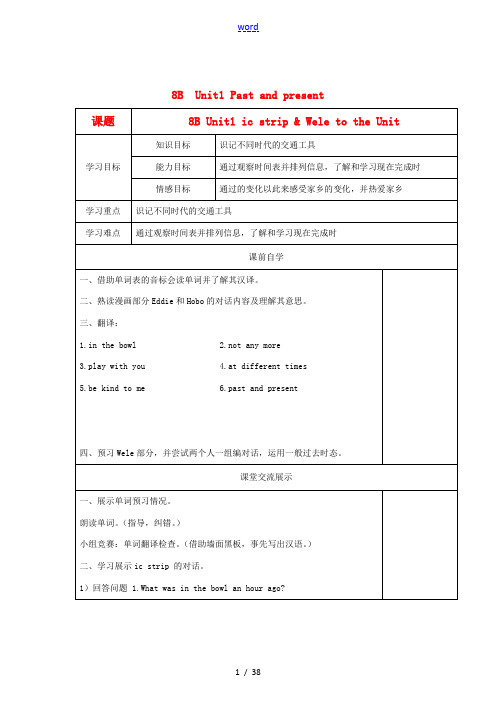
8B Unit1 Past and present8B Units1导学案参考答案Unit1第一课时:一、1.was 2.has eaten 3.to have 4.to play 5.is eating 6.took 7.rode8.will be二、1.would like , grows up 2.walks to school 3.goes to work by bus 4.flies to5.don’t want to any more第二课时:一、1.know about 2.get married 3.move out 4.water pollution 5.in the centreof6.feel lonely7.turn into8.from time to timeed to do 10.in some ways二、well has lived southern got married in the centre of children has changed a lotmarket stallsHas turned into to play cards pleasant shoe factory waste waterfish and plants polluted took action cleaner in some ways open space lonely第三课时:一、1. I don’t want to play with you any more.2.There used to be the home of birds.3.He live in Beijing since he moved here.4.In the past ,many people had no money to go to school.5.Nanjing has changed a lot in the past five years.6.Many friends have moved to other places ,so I feel lonely from time to time.7.I had an interview with my Chinese teacher this morning.8.It has bee more difficult to play chess with my old friends.二、1.Where have they gone ..2.How long has lived3.When was born4.you helping me第四课时:一、1.dishonest 2.unhappy 3.unlucky 4.impolite 5.unkind二、D C C B C A三、1.cheaper 2.healthiest 3.impossible 4.safely 5.well better第五课时:一、1.They haven’t read the book yet.Have they read the book yet? Yes, they have/ No , they haven’t1.How long has Daniel stayed in Shanghai?2. I have known him for ten years.3.Sandy has been in Beijing for half an hour.二、1. Have seen have did see2.lent hasn’t given 3.have been did visit第六课时:一、C C A A D B二、1. He has already finished homework.2.Have you ever been to Beijing?3.I have known Linda for 3years.4. I have just seen Lily.5.We haven’t heard from him for a long time.第七课时:一、1.is 2.do 3.will be 4.shall go 5.taught 6.has taught 7.has gone8.Have seen 9.have learned 10.will arrive二、1.How long have you known him?2.Has Jane finished her homework?3.I haven’t worked in this school for two years.4.Why hasn’t Jim finishedhis homework?5.when did you buy this watch?6.Who is the old man next to Lily?7.Which girl is my sister?8.How far is your home from your school?第八课时:一、1.advantages 2.reduce 3.changed 4.developments 5.service6.interview7.realizes 9.repair二、1.recently 2.unpleasant 3.impolite 4.have done 5.left6.southern7.polluted8.Has arrived arrived9.has eaten 10.have been第九课时:第十课时:一、1.as often as before 2. have an interview with sb ed to do sth 4.so big and modern5.in the north of二、1. was has lived 2.was made 3.Has arrived arrived 4.has eaten5.safely6.has been7.have been三、1.B 2.C 3.B 4.C 5.D 6.A四、1.Have you anything 2.doesn’t provide any longer 3.since ago ed to5.has been to。
八年级下册英语第一单元教学教案5篇
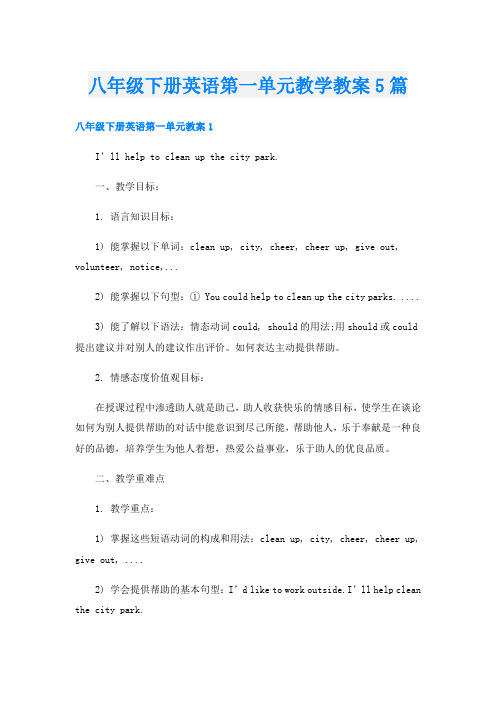
八年级下册英语第一单元教学教案5篇八年级下册英语第一单元教案1I’ll help to clean up the city park.一、教学目标:1. 语言知识目标:1) 能掌握以下单词:clean up, city, cheer, cheer up, give out, volunteer, notice,...2) 能掌握以下句型:① You could help to clean up the city parks. ....3) 能了解以下语法:情态动词could, should的用法;用should或could 提出建议并对别人的建议作出评价。
如何表达主动提供帮助。
2. 情感态度价值观目标:在授课过程中渗透助人就是助己,助人收获快乐的情感目标,使学生在谈论如何为别人提供帮助的对话中能意识到尽己所能,帮助他人,乐于奉献是一种良好的品德,培养学生为他人着想,热爱公益事业,乐于助人的优良品质。
二、教学重难点1. 教学重点:1) 掌握这些短语动词的构成和用法:clean up, city, cheer, cheer up, give out, ....2) 学会提供帮助的基本句型:I’d like to work outside.I’ll help clean the city park.2. 教学难点:学会提供帮助的基本句型三、教学过程Period 1(Section A 1a-2d)Step 1 Warming up1. 播放学生志愿者进行义务帮助别人的活动视频,通过询问他们以下问题来引导学生们了解社会上一些的志愿们进行的活动。
Step 2 New words Read new words on p9-10.Step 3 Discussion1. 1a. Look at the ways you could help others. Then list other ways.2. Ss discuss with their partners and write the ways one could help others:① Help plant trees by the river. ② Help clean up the city park.③ Visit the old people in the old people’s home. ④ Help young kids to learn English.Step 4 Listening1. T: Tell Ss to read the sentences in the chart. Make sure they know the meaning of the sentences.2. 1b. Play the recording for the Ss to listen and number the ways the boy and girl could help others.Step 5 Pair work1. Let Ss read the conversation in the picture.2. 1c. Use the information in the chart of 1b to make other conversations.A: I hope to work outside.B: You could help to clean up the city parks. ........3. Let some pairs act out their conversations.Step 6 Listening1. 2a:T: A group of students are planning a City Park Clean-up Day. Listen and check (√) the things they are going to do to tell people about it.1. Look at the pictures in 2a. Discuss the things they are going to do.2. Play the recording for the Ss to listen and check the pictures.3. Play the recording again to check the answers.2. 2b:1. Let Ss read the sentences below. Explain some main sentences for the Ss. Make sure they know what to do.2. Play the recording for the Ss to write the correct words in the blanks.3. Play the recording again to check the answers.Step 7 Pair work1. 2c. Tell Ss to make a conversation using the information in 2a and 2b.2. Let one pair to read out thei r conversation first.e.g. A: We need to come up with a plan for the City Park Clean-Up Day.B: Let’s have lunch first.A: No, we need to start now. Clean-Up Day is only two weeks from now.B: You’re right. We can’t put off making a plan. As we talk, I’ll write down all our ideas. Then we can decide which ideas are best.A: Let’s make some notices, too. Then I’ll hand them out after school.B: And we could each call up ten students and ask them to come.3. Ss act the conversation in pairs. Ask some pairs to act out their con versations.Step 8 Reading and Role-play1. Read the conversations and answer the two questions:① Where’s Helen going to work this summer?__________________________________② What did Tom do to help the old people?____________________________________Answers: She’s going to work in an old people’s home.Reading the newspaper or just talking to the old people.2. Read the conversation after the teacher.3. Practice the conversation with their partner. Then let some pairs to act out the conversation.Homework:Teaching thought:Period 2(Section A 3a-3c)Step 1 Revision1. Write down the phrases.1. 打扫 ________2. 分发 ________3. 曾经 _______4. (使)变得高兴 ________5. 义务做某事 _________________6. 大打扫日 ______________7. 想出主意(办法)____________2. Role-playA: Hi, Tom. I’m making some plans to work in an old people’s home this summer.B: Really? I did that last summer!Step 2 New words Read new words on p11.Step 3 Reading1.Tell Ss to read the article in 3a quickly and try to find the answers to these questions:1. What does Mario love?2. What does Mary love?3. What do Mario and Mary volunteer to do?Ss read the article quickly and try to answer the questions:Answers: 1. He loves animals.2. She loves reading books.3. Mario volunteers at animal hospital and Mary helps kids learn to read.2.3b: Read the article again and answer the questions.1. Why does Mario volunteer to help others?2. Why does Mary volunteer to help others?3. What does Mario say about volunteering?4. What does Mary say about volunteering?Answers: 1. Because he believes it can help him to get his future dream job.2. Because she can do what she loves to do and help others.3. He gets such a strong feeling of satisfaction when he sees the animals get better and the look of joy on their owners’ face.4. Volunteering is a dream come true for her.Homework Make sentences with these words.help (to) do; want to do; learn to do; decide to do; how to do; volunteer to doTeaching thought:Period 3(Grammar Focus-4c)Step 1 RevisionComplete the sentences.Mario and Mary ____ ___ several hours each week __ ____ others. Mario wants __ ___ an animal doctor. He _________ at an animal hospital. He wants __ _____ more about ____ __ care for animals.Mary is a book lover. She could read by herself __ ___ ____ of four. Last year, she decided __ ___ ___ for a volunteer after-school _______ program. Mary still works there once a week __ ____ kids _____ __ read. Volunteering here is a dream come true for her. She can what she _____ ___ ___and helps others at the same time.Can you tell something about Mary to us?Answers: give up, to help, to be, volunteers, to learn, how to, at the age, to try out, reading, to help, learn to, loves to do Step 2 Grammar focus1. 阅读Grammar Focus中的句子,然后做填空练习。
八年级英语下册Unit1教案
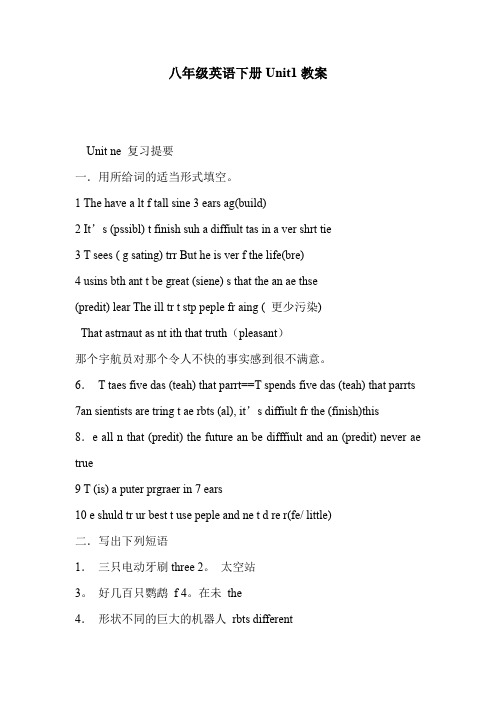
八年级英语下册Unit1教案Unit ne 复习提要一.用所给词的适当形式填空。
1 The have a lt f tall sine 3 ears ag(build)2 It’s (pssibl) t finish suh a diffiult tas in a ver shrt tie3 T sees ( g sating) trr But he is ver f the life(bre)4 usins bth ant t be great (siene) s that the an ae thse(predit) lear The ill tr t stp peple fr aing ( 更少污染)That astrnaut as nt ith that truth(pleasant)那个宇航员对那个令人不快的事实感到很不满意。
6.T taes five das (teah) that parrt==T spends five das (teah) that parrts 7an sientists are tring t ae rbts (al), it’s diffiult fr the (finish)this8.e all n that (predit) the future an be difffiult and an (predit) never ae true9 T (is) a puter prgraer in 7 ears10 e shuld tr ur best t use peple and ne t d re r(fe/ little)二.写出下列短语1.三只电动牙刷three 2。
太空站3。
好几百只鹦鹉f 4。
在未the4.形状不同的巨大的机器人rbts different.实现梦想realize the drea===ae the drea6.驾飞船到月球t the n 7 fall in lve ith8 穿戴更随意些re 9。
八年级英语下册 Module 1 Unit 1 It smells delicious教案 (新版)
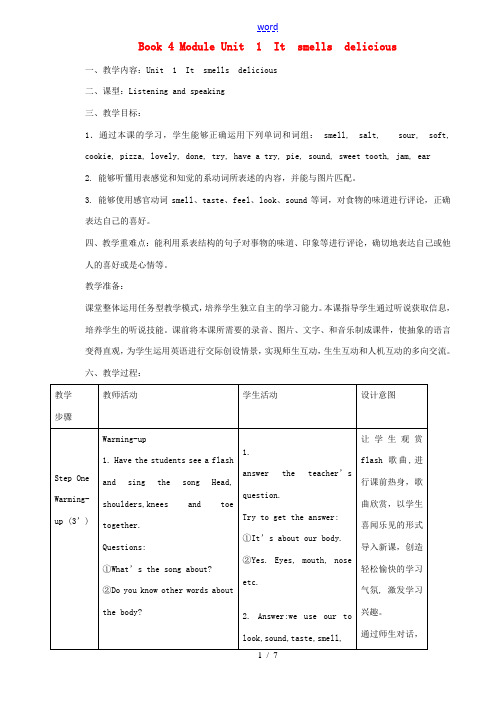
Book 4 Module Unit 1 It smells delicious一、教学内容:Unit 1 It smells delicious二、课型:Listening and speaking三、教学目标:1.通过本课的学习,学生能够正确运用下列单词和词组: smell, salt, sour, soft, cookie, pizza, lovely, done, try, have a try, pie, sound, sweet tooth, jam, ear2. 能够听懂用表感觉和知觉的系动词所表述的内容,并能与图片匹配。
3. 能够使用感官动词smell、taste、feel、look、sound等词,对食物的味道进行评论,正确表达自己的喜好。
四、教学重难点:能利用系表结构的句子对事物的味道、印象等进行评论,确切地表达自己或他人的喜好或是心情等。
教学准备:课堂整体运用任务型教学模式,培养学生独立自主的学习能力。
本课指导学生通过听说获取信息,培养学生的听说技能。
课前将本课所需要的录音、图片、文字、和音乐制成课件,使抽象的语言变得直观,为学生运用英语进行交际创设情景,实现师生互动,生生互动和人机互动的多向交流。
六、教学过程:达标训练题一. 根据句意和汉语提示完成句子。
1. 这菜闻起来好香啊.The dish _______________.2. 这汤尝起来不新鲜.The soup ______________ fresh.3. 这毛衣摸起来很软很舒服。
The sweater _______________________.4. Children like _______ (小甜饼)very much.5. People should eat less ______ ( 盐 ) everyday.6. Oh. It’s my _______(幸运的)day. I'vepassed the exam.二. 单项选择:1. These flowers ______beautiful. I will buysome for my mother.A. lookB. soundC. hearD. taste2. The air in the countryside smells _______.A. sourB. softC. deliciousD. fresh3. The idea ________ good. We can try it.A. tasteB. tastesC. soundsD. sound4. This game is so interesting, please_____ .A. have a lookB. give upC. have a tryD. try some5. Last Sunday was my mother’s birthday, so I _____ a big meal for her.A. cookB. cooksC. cookedD. is cooking。
新人教版八年级英语下册Starter Unit 1 教案(共计11页)

Starter Unit1Good morning!一、单元教材分析本单元要求学生掌握英文字母A—H,能认读其印刷体和手写体字母的大小写等四种形式。
书写(大写和小写,笔顺,笔画)基本合乎要求。
学习一些简单的英文名字,注意区别性别,并为自己取一个英文名字。
能看、听、说、唱本单元所列的日常交际用语,重点学会打招呼、相互问候并做到语音语调正确。
注意一些字母及日常交际用语的发音,总结元音字母a和e的发音规则。
二、单元学情分析本单元围绕“问候他人”这一话题,展开听、说、读、写的教学活动。
为了创设较为真实的语言环境,首先让学生们认识一些较为简单的英文名字,并让学生们为自己取一个英文名字,让学生们感知、认识英语,并尽快进入英语的环境中。
在教学过程中应让学生体会打招呼用语的奥妙所在,做到灵活运用。
刚开始学习英语,学生们肯定对学习英语的兴趣非常深厚,教师一定要利用好这一点,让学生在学习英语中能获得乐趣。
并逐步让学生们形成稳定的学习兴趣。
三、单元教学建议采用自主学习、小组合作学习、Role playing、pair work等方式开展听、说、读、写的学习活动。
教师要尽量利用幻灯片、挂图、实物等给学生创造较为真实的英语情景。
在教学中创设切实可行的任务型教学活动、突出交际性。
引趣激趣策略,创设情景调节气氛,引发激发学生兴趣。
教师可以用手势,表情,动作等示意,帮助学生听懂课堂用语和日常交际用语,不讲或少讲汉语。
四、单元课时分配本单元可用2课时完成教学任务:(1a-2e) 用1课时(3a-4d) 用1课时(1a-2d)一、教学目标:1. 语言知识目标:1) 能掌握以下词汇:字母Aa ~ Hh, good, morning, Good morning!, hi, hello2) 能掌握以下句型:①Good morning, Helen!②Hello, Frank!③Hi, Bob!3) 能理解用英语打招呼的不同说法,并能灵活运用。
人教版八年级下册英语第一单元教学设计

人教版八年级下册英语第一单元教学设计全文共10篇示例,供读者参考篇1Title: My Lesson Plan for Unit 1 of Grade 8 EnglishHello everyone! Today I am going to share with you my super fun lesson plan for Unit 1 of Grade 8 English. Are you ready? Let's get started!1. Warm-up (10 minutes)To start off the lesson, we will play a quick game of "Simon Says" to review some vocabulary from the previous unit. I will say words like "apple" or "book" and you have to do the action if I say "Simon says". This will get our brains warmed up and ready to learn!2. Vocabulary Introduction (20 minutes)Next, we will learn some new words related to the unit theme of "My hobbies". I will use flashcards and pictures to help you understand the meanings of words like "painting", "dancing", and "swimming". We will practice saying the words and make sentences using them.3. Reading Activity (30 minutes)Now it's time for some reading practice! I will read a short passage about different hobbies and you will listen carefully. After that, we will discuss the main ideas of the passage and answer some questions to check our understanding. This will help us improve our reading skills.4. Speaking Practice (20 minutes)In this activity, we will work in pairs to talk about our own hobbies. You will ask your partner questions like "What do you like to do in your free time?" and "Why do you enjoy that hobby?". This will help us practice speaking in English and improve our communication skills.5. Writing Task (20 minutes)For our writing task, you will write a short paragraph about your favorite hobby. Use the new vocabulary words we learned earlier and try to make your writing interesting and creative. Don't forget to include reasons why you enjoy that hobby!6. Review and Wrap-up (10 minutes)To end the lesson, we will review the key points we learned today and do a quick quiz to see how much you remember. I willalso give you some homework to practice at home. Remember, practice makes perfect!I hope you enjoyed my lesson plan for Unit 1 of Grade 8 English. Let's keep working hard and improving our English skills together! Thank you for listening and see you next time! Bye bye!篇2Hello everyone! Today I am going to share with you the teaching design for the first unit of the Eighth Grade English textbook from People's Education Press.First, let's talk about the objectives of this unit. By the end of the unit, students should be able to introduce themselves and others, talk about likes and dislikes, and ask and respond to questions about hobbies and interests.To achieve these objectives, I have planned the following activities:1. Warm-up activity: I will start the lesson with a fun icebreaker activity where students will introduce themselves using simple English phrases like "My name is..." and "I am from...". This will help create a positive and interactive learning atmosphere.2. Vocabulary building: I will introduce key vocabulary related to hobbies and interests such as "reading, swimming, playing basketball, listening to music, etc." Students will practice pronouncing and using these words in sentences.3. Listening and speaking practice: I will play a recording of different people talking about their hobbies and interests. Students will listen and answer questions related to the recording. Then, they will work in pairs to interview each other about their hobbies.4. Reading comprehension: I will distribute a short passage about a student's favorite hobby. Students will read the passage and answer comprehension questions to check their understanding.5. Writing task: Students will write a short paragraph about their own hobbies and interests. They will then share their paragraphs with the class to practice speaking in front of others.6. Group discussion: In groups, students will discuss and share their favorite hobbies and interests. They will also talk about common interests they have with their classmates.7. Review and assessment: At the end of the unit, I will give students a quiz to test their understanding of the vocabulary andgrammar covered in the unit. I will also ask them to present a short skit where they introduce themselves and talk about their hobbies.I hope this teaching design will help students learn and practice English in a fun and engaging way. Let's work hard and improve our English skills together!篇3Hey guys! Today we're going to talk about the first unit in the eighth grade English textbook. It's all about "My Day". I'm so excited to teach you all about it!First, we'll start with the key vocabulary words. We have things like "morning", "afternoon", "evening", and "night". These are all important words to describe different times of the day. We'll also learn about activities we do during each of these times, like "get up", "have breakfast", "go to school", "do homework", and "go to bed".Next, we'll practice using these words in sentences. For example, "I get up in the morning and have breakfast". Or "I go to school in the afternoon and do homework in the evening". Try to make your own sentences using these words!Then, we'll move on to grammar. We'll learn about the simple present tense and how to use it correctly. Remember to use the base form of the verb for most subjects, like "I", "you", "we", and "they". But don't forget to add an "s" to the verb for subjects like "he", "she", and "it".Finally, we'll do some fun activities to practice what we've learned. We can play games, do role plays, or even make a daily schedule for ourselves. It will be a lot of fun!I hope you're all as excited as I am to learn about "My Day". Let's have a great time learning together!篇4Hello everyone! Today I'm going to talk about our first unit in the Grade 8 English textbook. It's called "A new start".First, we will learn some new words like ambition, curious, survive, communicate, etc. We can use flashcards or games to help us remember them.Next, we will learn the grammar rules. In this unit, we will focus on the past simple tense and how to form questions and negative sentences using it. We can practice by makingsentences about our weekend activities or what we did during the holidays.Then, we will read a text about a girl named Sarah who moves to a new city and tries to adapt to her new surroundings. We will discuss the main idea and key details of the text and talk about how Sarah overcomes her challenges.After that, we will work on our speaking and listening skills by doing some role play activities. We can pretend to be Sarah and her new friends and have conversations about our interests and hobbies.Finally, we will do some writing tasks where we can write about our own ambitions and goals for the future. We can also write a short story using the past simple tense.I hope you're all excited to start this new unit with me. Let's work hard and have fun learning English together!篇5Hello everyone! Today, I’m going to share with you my teaching plan for the first unit of the eighth grade English textbook. Let’s dive in!First off, we will start the lesson by introducing the topic of the unit, which is “School Life”. We will ta lk about different school subjects, daily routines, and school activities. I will use pictures, videos, and real-life examples to make the lesson more interesting and engaging.Next, we will focus on key vocabulary and grammar points in the unit. We will learn how to talk about our school subjects, describe our daily routines, and express our likes and dislikes. I will use games, role-plays, and group activities to help reinforce the new vocabulary and grammar structures.After that, we will work on listening and speaking skills. We will listen to dialogues, watch videos, and practice speaking exercises to improve our communication skills. I will also encourage students to work in pairs or small groups to practice speaking in a more interactive way.Then, we will move on to reading and writing activities. We will read short passages about school life, answer comprehension questions, and write short paragraphs about our own school experiences. I will provide feedback and guidance to help students improve their reading and writing skills.Finally, we will review and assess what we have learned in the unit. We will play review games, complete worksheets, and take aquiz to test our knowledge. I will also encourage students to reflect on their learning and set goals for improvement.Overall, my teaching plan for the first unit of the eighth grade English textbook is designed to be fun, interactive, and engaging. I hope that by the end of the unit, all students will have improved their English skills and gained a deeper understanding of school life. Thank you for listening and let’s have a great lesson together!篇6Design of the first unit in Grade 8 of the People's Education Press EnglishHi everyone, I'm going to tell you about the teaching plan for the first unit in Grade 8 of the People's Education Press English! This unit is all about "School Life", so let's get started!First, we will start by introducing the new vocabulary words like "homework", "classmate", and "schedule". We can play games like bingo or charades to help us remember these words.Next, we will practice using these words in sentences by doing some activities like matching pictures with words or fillingin the blanks. We can also do some role-playing exercises where we act out different school situations using the new vocabulary.After that, we will move on to grammar and focus on the present simple tense. We will learn about how to form positive, negative, and question sentences using this tense. We can practice by writing sentences about our daily routines and then sharing them with the class.Finally, we will work on our listening and speaking skills by listening to dialogues and answering questions about them. We can also practice speaking by doing pair work activities where we ask and answer questions about our school lives.In the end, we will have a review session where we can play games or do some fun activities to help us remember everything we have learned in this unit.I hope you guys are excited to start learning about "School Life" in Grade 8! Let's have a great time learning together!篇7Hello everyone! Today I'm going to share with you a super fun lesson plan for the first unit of Grade 8 English textbook by People's Education Press. Are you ready? Let's get started!1. Warm-up activities (10 minutes)To start off the lesson, let's do a quick warm-up activity. We can play a game of vocabulary charades, where one student acts out a word from the unit vocabulary list while the rest of the class tries to guess what it is. This will help get everyone excited and engaged for the lesson.2. Introduction to the unit (15 minutes)Next, let's introduce the theme of the unit, which is about traveling. We can show a short video clip of different modes of transportation and famous landmarks around the world. This will help students understand the context of the unit and get them interested in learning more about different cultures.3. Reading and comprehension (20 minutes)Now it's time to dive into the reading passage for this unit. We can have students read the passage individually or in pairs, and then discuss comprehension questions as a class. This will help students practice their reading skills and improve their understanding of the text.4. Vocabulary practice (15 minutes)After reading the passage, let's do some vocabulary practice. We can play a matching game where students match words fromthe unit vocabulary list with their definitions. This will help reinforce new words and concepts learned in the reading passage.5. Grammar focus (20 minutes)In this unit, the grammar focus is on using the present perfect tense. Let's do some exercises together to practice forming sentences in the present perfect tense. We can also have students write short paragraphs using the present perfect tense to describe their own travel experiences.6. Speaking activity (15 minutes)To wrap up the lesson, let's do a speaking activity where students can practice using the vocabulary and grammar structures learned in this unit. We can have students pair up and take turns asking each other questions about their favorite travel destinations, using the present perfect tense.7. Homework assignment (5 minutes)Lastly, let's assign a homework task for students to complete before the next lesson. This can be a writing assignment where students write a short essay about their dream vacation using the vocabulary and grammar structures learned in this unit.I hope you enjoyed this lesson plan for the first unit of Grade8 English textbook. Have fun learning and exploring the world of travel! See you next time!篇8Hello everyone, my name is Lily and today I'm going to share with you the teaching plan for Unit 1 of the Eighth Grade English textbook in the People's Education Edition.First, we will start the lesson by introducing the new vocabulary words such as culture, custom, behavior, etc. We can use flashcards or pictures to help students understand the meaning of these words better.Next, we will move on to the grammar points in this unit. We will focus on the past continuous tense and how to use it in sentences. We can give students some examples and ask them to make their own sentences using the past continuous tense.After that, we will discuss the reading passage in the textbook. We will read the passage together as a class and then ask students some comprehension questions to check their understanding. We can also ask students to summarize the main idea of the passage in their own words.For the speaking practice, we can set up role-play activities where students can act out different scenarios related to the topic of the unit. This will help students improve their speaking skills and also apply what they have learned in a real-life situation.Finally, we will end the lesson by giving students a short quiz to assess their understanding of the unit. This will help us identify any areas that need further clarification or review.I hope you find this teaching plan helpful and that your students enjoy learning English in a fun and interactive way. Thank you for listening!篇9Unit 1: School LifeHey friends! Today we're gonna talk about the first unit in our English textbook, "School Life". It's gonna be super cool and fun!First, we're gonna learn some new words like "classroom", "teacher", "homework", "test", and "friend". These words are super important for us to talk about our school life.Next, we're gonna learn some grammar rules like present simple tense, past simple tense, and future tense. We need to know how to use these tenses to talk about our daily routines, past events, and future plans.After that, we're gonna do some reading and listening exercises to improve our reading and listening skills. We'll read some stories about school life and listen to some conversations between classmates.Then, we're gonna do some speaking and writing activities to practice our speaking and writing skills. We'll talk about our school life, our favorite subjects, and our school activities. We'll also write some compositions about our school life and our future dreams.In the end, we're gonna have a unit test to see how much we've learned in this unit. Don't worry, we've been studying hard and we're gonna do great!So get ready to have some fun learning about school life in this unit. Let's do our best and have a blast! Let's go!篇10Unit 1 Making New FriendsHey guys! Today I’m going to share with you the teaching plan for the first unit of our 8th grade English textbook. This unit is all about making new friends, so get ready to learn how to introduce yourself and start conversations with people.Lesson 1: Greetings and IntroductionsIn this lesson, we will learn how to greet people and introduce ourselves. We will practice saying “Hello, my name is…” and “Nice to meet you.” We will also learn some common questions to ask when meeting someone new. At the end of the lesson, we will do a role play where we introduce ourselves to a new friend.Lesson 2: Hobbies and InterestsIn this lesson, we will talk about our hobbies and interests. We will learn how to ask “What do you like doing in your free time?” and h ow to respond with our own hobbies. We will have a discussion in pairs about our favorite activities and interests. We will also learn how to invite someone to do something together.Lesson 3: Making PlansIn this lesson, we will learn how to make plans with our friends. We will practice using phrases like “Let’s hang out thisweekend” and “What time works for you?” We will also learn how to accept or decline an invitation politely. At the end of the lesson, we will plan a group outing together.I hope you guys are excited to start making new friends and practicing your English skills! Remember to speak up and participate in the activities. Let’s have fun learning together!。
人教版八年级下册英语Unit1(第一单元)优秀教案

Unit 1 What's the matter?第一课时Section A (1a2d)【教学目标】1.重点单词:matter,back,sore,throat,stomachache,foot,neck,stomach,fever,lie,rest,cough,Xray,toothache,headache2 重点短语:have a sore throat,have a stomachache,have a cold,lie down,take one's temperature,have a fever,go to a doctor3 重点句式:—What's the matter?—She talked too much yesterday and didn't drink enough water.She has a very sore throat now.You should drink some hot tea with honey.It doesn't sound like you have a fever.You need to take breaks away from the computer.I think I sat in the same way for too long without moving.If your head and neck still hurt tomorrow,then go to a doctor.【学习重点】1 重点短语和句型2 询问对方身体状况的句型及答语【学习难点】询问对方身体状况的句型及答语【自主学习】一、预习课本P12新单词并背诵,完成下面的汉译英。
1 问题____________ 2.背部____________3 疼痛的____________ 4.嗓子____________5 胃痛____________ 6.脚____________7 脖子____________ 8.胃____________9 发烧____________ 10.平躺____________11 休息____________ 12.咳嗽____________13 X光____________ 14.牙疼____________15 头疼____________二、认真预习1a2d找出下列短语和句型。
【人教版新目标】英语八年级下册Unit1单元教案
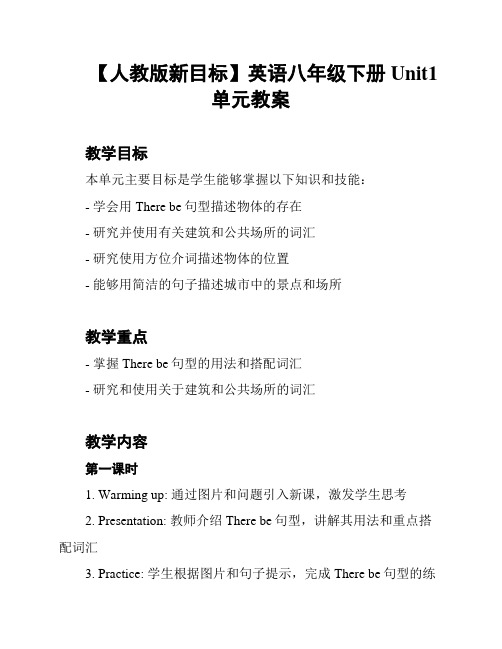
【人教版新目标】英语八年级下册Unit1单元教案教学目标本单元主要目标是学生能够掌握以下知识和技能:- 学会用There be句型描述物体的存在- 研究并使用有关建筑和公共场所的词汇- 研究使用方位介词描述物体的位置- 能够用简洁的句子描述城市中的景点和场所教学重点- 掌握There be句型的用法和搭配词汇- 研究和使用关于建筑和公共场所的词汇教学内容第一课时1. Warming up: 通过图片和问题引入新课,激发学生思考2. Presentation: 教师介绍There be句型,讲解其用法和重点搭配词汇3. Practice: 学生根据图片和句子提示,完成There be句型的练4. Listening: 听录音,完成听力练,提高对There be句型的理解和运用能力第二课时1. Revision: 复There be句型的用法和练2. Vocabulary: 教授与建筑和公共场所相关的词汇,并进行操练3. Listening and speaking: 听录音,回答问题,进行口语练4. Grammar: 通过课文例句,进一步理解方位介词的用法和意义第三课时1. Reading: 学生阅读课文,了解城市景点和场所的描述和位置2. Vocabulary: 教授与城市景点和场所相关的词汇,并进行操练3. Speaking: 学生自由交流,描述自己熟悉的城市景点和场所4. Writing: 学生写一篇短文,介绍自己喜欢的城市景点和场所,运用所学词汇和句型教学扩展- 自主研究:鼓励学生积极参与课后研究,完成相关练和作业- 学科融合:与地理学科结合,通过展示和讨论不同城市的特点和景点等- 实地考察:组织学生到附近的公共场所参观,提高实践能力与综合素养以上为预设的教学内容和安排,教师可根据实际情况进行调整和适当的教学设计。
八下英语unit1译林版教案

八下英语unit1译林版教案Unit 1: The World of Our Senses A Teaching Plan for Grade 8 English (译林版)。
Introduction:Unit 1 of the Grade 8 English curriculum focuses on the theme "The World of Our Senses." This unit aims to help students understand the importance of the five senses in our daily lives and how they contribute to our perception of the world around us. Through a variety of activities, discussions, and readings, students will explore the role of the senses in communication, observation, and understanding.Objectives:To develop students' understanding of the five senses and their importance in daily life.To improve students' ability to use descriptive language to express sensory experiences.To encourage students to think critically about therole of the senses in communication and perception.To provide opportunities for students to practice using the five senses in different contexts.Key Vocabulary:Sight, hearing, taste, touch, smell。
(完整版)新人教版八年级下册英语全册教案
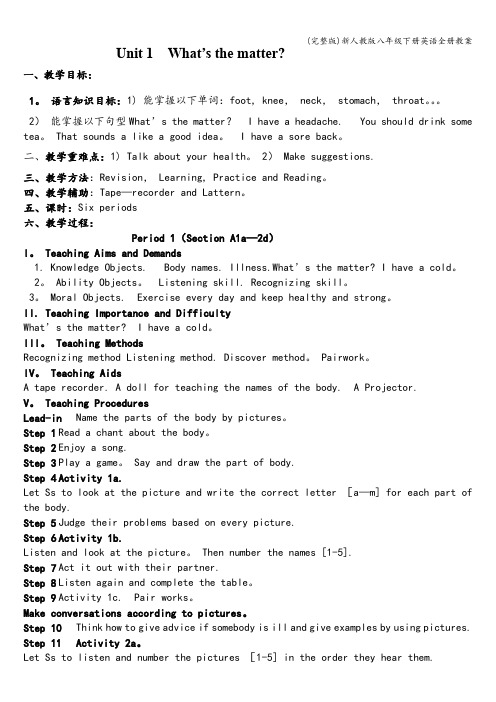
Unit 1 What’s the matter?一、教学目标:1。
语言知识目标:1) 能掌握以下单词:foot, knee, neck, stomach, throat。
2)能掌握以下句型What’s the matter? I have a headache. You should drink some tea。
That sounds a like a good idea。
I have a sore back。
二、教学重难点:1) Talk about your health。
2) Make suggestions.三、教学方法:Revision, Learning, Practice and Reading。
四、教学辅助:Tape—recorder and Lattern。
五、课时:Six periods六、教学过程:Period 1(Section A1a—2d)I。
Teaching Aims and Demands1. Knowledge Objects. Body names. Illness.What’s the matter? I have a cold。
2。
Ability Objects。
Listening skill. Recognizing skill。
3。
Moral Objects. Exercise every day and keep healthy and strong。
II. Teaching Importance and DifficultyWhat’s the matter? I have a cold。
III。
Teaching MethodsRecognizing method Listening method. Discover method。
Pairwork。
IV。
Teaching AidsA tape recorder. A doll for teaching the names of the body. A Projector.V。
八年级下英语第一单元教案5篇
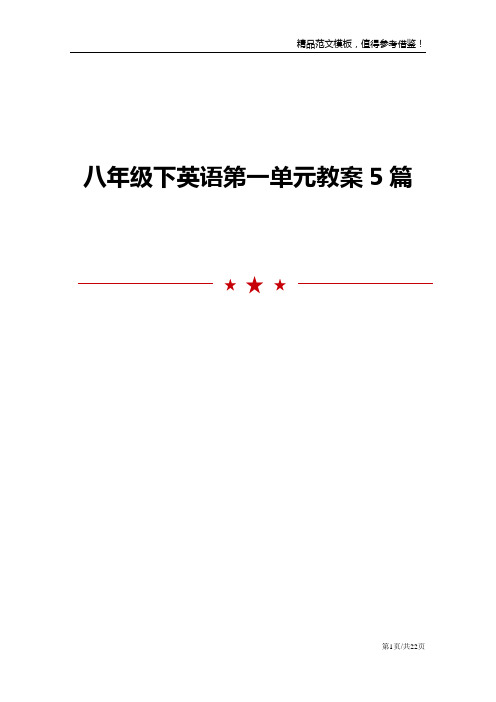
八年级下英语第一单元教案5篇八年级下英语第一单元教案5篇英语是印欧语系-日耳曼语族下的语言,由26个字母组合而成,英文字母渊源于拉丁字母,拉丁字母渊源于希腊字母,而希腊字母则是由腓尼基字母演变而来的。
英语是国际指定的官方语言(作为母语),也是世界上最广泛的第一语言,英语包含约49万词,外加技术名词约30万个,是词汇最多的语言,也是欧盟以及许多国际组织以及英联邦国家的官方语言,拥有世界第三位的母语使用者人数,仅次于汉语和西班牙语母语使用者人数。
以下是带来的八年级下英语第一单元教案内容,感谢您的阅读,希望能帮助到您!八年级下英语第一单元教案1一、指导思想以“英语课程标准”为宗旨,适应新课程改革的需要,面向全体学生,提高学生的人文素养,增强实践能力和创新精神。
正确把握英语学科特点,积极倡导合作探究的学习方式。
培养学生积极地情感态度和正确的人生价值观,提高学生综合素质为学生全面发展和终身发展奠定基础。
二、教材分析《新目标英语》八年级(下册),全书共有十个单元,另两个复习单元,每个单元都列出了明确的语言目标,主要的功能项目与语法结构,需要掌握的基本词汇,并分为A和B两部分。
A部分是基本的语言内容,B部分是知识的扩展和综合的语言运用。
每个单元还附有SELFCHECK部分,学生可用来自我检测本单元所学的语言知识。
本教材各单元话题灵活,贴近生活实际。
在本册书里要学习的一些语法知识点有:一般将来时、过去进行时、现在完成时、间接引语、时间状语从句、条件状语从句、反意疑问句等。
同时每个单元后都提供了一篇阅读文章,用以训练学生的阅读能力,扩大学生的阅读量。
三、具体目标1、要使学生受到听、说、读、写英语的训练,掌握最基础的语言知识和语言技能以及培养初步援用英语交际的能力;养成良好的外语学习习惯,掌握学习外语的基本方法;为进一步学习和运用英语打下扎实的基础。
2、使学生明确学习英语的目的性并且树立学习英语的自信心。
3、培养初步运用英语交际的能力和自学能力。
新译林版八年级下册英语 Unit 1 课时2 教案(教学设计)

Unit 1 Past and presentReading 11 To grasp some useful expressions2 To infer general meaning from title and contextThe understanding of the readingStep 1 Free talkWhere is your hometown?Has it changed a lot?Can you tell us something about the changes to your hometown?As you know, I am a teacher now. But five years ago, I was a teacher, too. So I have worked here for 3 years. I think our school changed a lot. Do you think so? Everything has changed a lot?Step 2 Presentation.Have you been to Beijing? Now, look at some pictures of it. Witness great changes to it over 100 years. Show pictures.Step 3 Reading A1. Would you like to listen to Mr Chen, Daniel’s grandpa? Play the tape for Ss 2 times. Answer the following questions.How long has Mr Chen known Sunshine Town?Did Mr Chen live there all the time? Why?Does Mr Chen think the place changed a lot?What are the differences between the past and present?2.Check the answers if they can not answer.3. Explain some difficult points.4. Ask Ss to read in pairs and try to act it out.Step 4 Practice.1.Do the exercise on page 10 B1Match the words on the left with the meanings on the right.2. Finish off the exercises of partB2,3 on P10-11.(T/F). Step 5 Finish Part D on page 11Do the exercise(导学案当堂反馈)。
人教版八年级英语下册《Unit 1》教案
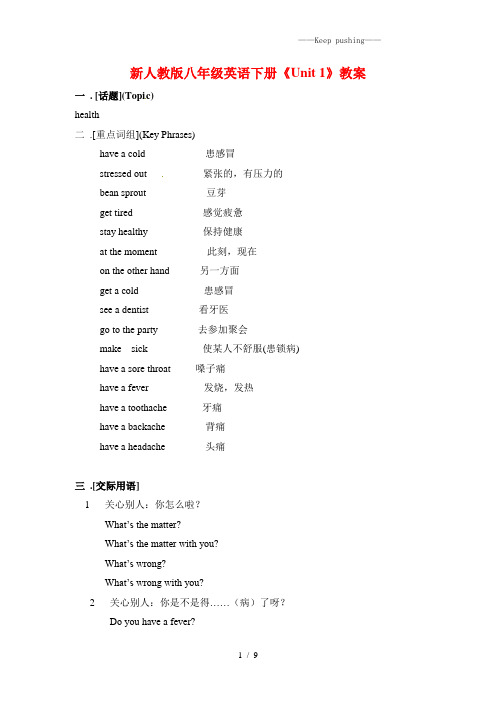
新人教版八年级英语下册《Unit 1》教案一. [话题](Topic)health二.[重点词组](Key Phrases)have a cold患感冒stressed out 紧张的,有压力的bean sprout豆芽get tired感觉疲惫stay healthy保持健康at the moment此刻,现在on the other hand另一方面get a cold患感冒see a dentist看牙医go to the party去参加聚会make sick使某人不舒服(患锁病)have a sore throat嗓子痛have a fever发烧,发热have a toothache牙痛have a backache背痛have a headache头痛三.[交际用语]1 关心别人:你怎么啦?What’s the matter?What’s the matter with you?What’s wrong?What’s wrong with you?2 关心别人:你是不是得……(病)了呀?Do you have a fever?Are you hungry?3 关心别人:你应该……,你最好……,为什么……?You should go to bed early.You shouldn’t eat anything for 24 hours.You’d better go to bed early.You’d better not eat anything for 24 hours.Why not go to bed early?Why don’t you go to bed early?4 关心自己:我不舒服,我病了,我饿了I’m not fe eling well.I have a headache.I am hungry.四. [重点难点释义](Language Points)1.What's the matter, Judy?朱迪,你哪里不舒服?(你怎么了?)matter n.问题,麻烦,事件,通常与介词“with”连用:What's the matter with him?他怎么了?这个句型可以与下面这两个句子互换:What's wrong with him?What's the trouble with him?wrong是形容词,前面没有“the”; matter和trouble都是名词,前面应有“the”, trouble前还可以用形容词性的物主代词。
人教版八年级下册英语教案unit1

人教版八年级下册英语教案unit1就英语教学过程而言,英语教案要充分体现开放性和动态生成性,从而赋予课堂教学以灵活性和多元性品格;下面是小编为大家精心整理的人教版八年级下册英语教案unit1,仅供参考。
人教版八年级下册英语教案unit1范文课题:Unit One Whats the matter? Period 1 Section A (1a-2d)一、Teaching date:二:学情及教学内容分析:主要讨论的话题是询问某人的健康状况以及遇到麻烦的表达方法。
本单元涉及到大量的表示人体部分的单词以及关于身体某部位不舒服的短语。
此外,本单元还涉及到党当人身体不适时,医生、朋友或亲人提出的意见的表达法。
本单元共有阅读类文章两篇,文章的主体时态都为一般过去时。
主要句型为.Whats the matter with?What should I/ you/ he/ she/they do? I/ you/ he/ she/they should do?I have a headache/stomachache/toothache. Does she/he/ have a fever/cold/toothache?总的来说,本单元的相关语法知识并不难。
教学目标:三:教学目标:1. 语言知识目标:1) 能掌握以下单词以及短语:matter, sore, have a cold, foot,neck, stomach, throat, fever, lie, lie down, rest, cough, toothache, headache, break, hurt, enough water, take breaks away from, all weekend, take ones temperature, in the same way, go to a doctor, see a dentist,2) 能熟悉以下句型:Whats the matter with?What should I/ you/ he/ she/they do?I/ you/ he/ she/they should do2. 情感态度价值观目标:教会学生关心他人,培养同学间团结、友善的精神。
八年级下英语Unit 1教案

B:What should I do?
A: You should take your temperature.
Step8Role–play
Imagine you are the school doctor. A few students have health problems. Role-play a conversation between the doctor and the students.
过程与方法
Train the students’ four skills.
情感态度价值观
Let’s have a healthy habit to have a healthy body..
教学重点
The key words and target language and the conversations.
2d Role –play the conversation
Step 9 Language points and summary
1. What’s the matter?
=What’s wrong?
=What’s your trouble?
=What’s up?
2.have a coldhave a bad coldhave a fever
Nurse: What’s the matter, Ben?
Boy: I _________________.
Conversation 4
Nurse: What’s the matter, Nancy?
Girl: I _________________.
Conversation 5
- 1、下载文档前请自行甄别文档内容的完整性,平台不提供额外的编辑、内容补充、找答案等附加服务。
- 2、"仅部分预览"的文档,不可在线预览部分如存在完整性等问题,可反馈申请退款(可完整预览的文档不适用该条件!)。
- 3、如文档侵犯您的权益,请联系客服反馈,我们会尽快为您处理(人工客服工作时间:9:00-18:30)。
根据上下文意思填空。 Mandy: Lisa, are you OK? Lisa: I _____ a headache and I can’t move my neck. What ______ I do? Should I _____ my temperature? Mandy: No, it doesn’t sound like you have a fever. What _____ you do on the weekend? Lisa: I played computer _____ all weekend. Mandy: That’s probably why. You need to take breaks _____ from the computer. Lisa: Yeah, I think I sat in the _____ way for too long without moving. Mandy: I think you should ____ down and rest. If your head and neck still hurt tomorrow, then go to a _______. Lisa: OK. Thanks, Mandy. 翻译下列句子。 1. 你怎么了?我头痛。 2. 他怎么了?他发烧 3. 李雷怎么了?他喉咙痛。他应该多喝水。 4. 如果你的头和脖子明天仍然疼的话,请去看医生。 Homework Make up a conversation between a doctor and a patient.
第二课时 Section A 2 (3a – 3c) Step 1 Presentation Look at the picture. Discuss what happened and then what we should do. Teacher: What happened in the picture. Students: Teacher: What should we do to help them? Students: Teacher: Did the bus driver help them? Students: Step 2 Reading 3a Read the passage and answer the following questions.
have a headache 头痛 have a stomachache 肚子痛, 胃痛 have a toothache Summary 1. 牙疼 have a toothache 2. 胃疼 have a stomachache 3. 背疼 have a backache 4. 头疼 have a headache 5. 喉咙疼 have a sore throat 6. 发烧 have a fever 7. 感冒 have a cold 8. 躺下并且休息 lie down and rest 牙痛
教 学 重 点
教学难点
1.掌握情态动词 should \shouldn’t. 的用法 2. 学习 have 的用法
教学准备
多媒 体课件 教 学 过 程 个人再探索
第一课时 Section A 1 (1a – 2d) Step 1 Warming up and new words 1. 2. Look at a picture and learn the parts of the body. New words and phrases.
___ leg ___ mouth___ neck
2a Listen and number the pictures [1-5] in the order you hear them. 2b Listen again. Match the problems with the advice. Step 7 Speaking 2c Make conversations using the information in 2a and 2b A: What’s the matter? B: My head feels very hot. A: Maybe you have a fever. B: What should I do? A: You should take your temperature. Step 8 Role–play Imagine you are the school doctor. A few students have health problems. Role-play a conversation between the doctor and the students. 2d Role –play the conversation Step 9 Language points and summary 1. What’s the matter? 这是人们特别是医生和护士询问病人病情时最常用的问句 , 意思是―怎 么了?‖其后通常与介词 with 连用。类似的问句还有: What’s wrong? 怎么啦? What’s wrong with you? 你怎么了? What’s your trouble? 你怎么了? What’s the trouble with you? 你怎么了? What’s up? 你怎么了? 2. have a cold 伤风, 感冒, 是固定词组 表示身体不适的常用词组还有: have a bad cold 重感冒 have a fever 发烧
9. 喝热蜂蜜茶 10. 喝大量水 11. 看牙医 12. 量体温 13. 看医生 Step 10 Exercises
drink hot tea with honey drink lots of water see a dentist take one’s temperature go to a doctor
Step 2 Presentation
1a. Look at the picture. Write the correct letter [a-m] for each part of the body. ___arm ___ back ___ ear ___hand ___ head ___ tooth Step 3 Listening 1b Listen and look at the picture. Then number the names 1-5 Listen to the conversations again and fill in the blanks. Conversation 1 Nurse: What’s the matter, Sarah? Girl: I ___________. Conversation 2 Nurse: What’s the matter, David? Boy: I _________________. Conversation 3 Nurse: What’s the matter, Ben? Boy: I _________________. Conversation 4 Nurse: What’s the matter, Nancy? Girl: I _________________. Conversation 5 Betty: What’s the matter, Judy? Ann: She __________________. Step 4 Speaking 1c Look at the pictures. What are the students’ problems? Make conversations. Examples A: What’s the matter with Judy? B: She talked too much yesterday and didn’t drink enough water. She has a very sore throat now. A: What’s the matter with Sarah? B: She didn’t take care of herself on the weekend. She was playing with her friends at the park yesterday. Then it got windy, but she didn’t put on her jacket. Now she has a cold. Step 5 Guessing games Guess what has happened to the students by using the important sentences. Step 6 Listening ___ eye ___ foot ___nose ___ stomach
年级 课型八年级 新Biblioteka 课学科 备课人英语
课题 邓顶明
Unit 1 What’s the matter? 课时数 4 课时
教 学 目 标
1 语言目标:描述健康问题的词汇,及如何根据别人的健康问题提建议。 2 技能目标:能听懂谈论健康问题的对话材料;能根据别人的健康问题提建议;能写出重点 单词和重点句型,并能描述怎样对待健康问题。 。 3 情感目标:通过开展扮演病人等活动,培养学生关心他人身体健康的品质。 通过本课的阅读,培养学生处理紧急事件的基本能力,树立紧急事件时互相帮 助的精神。 短语: have a stomachache, have a cold, lie down, take one’s temperature, go to a doctor, get off, to one’s surprise, agree to do sth., get into trouble, fall down, be used to, run out (of), cut off , get out of, be in control of , keep on (doing sth.), give up 句子: 1 What’s the matter? I have a stomachache. You shouldn’t eat so much next time. 2 What’s the matter with Ben? He hurt himself. He has a sore back. He should lie down and rest. 3 Do you have a fever? Yes, I do. No, I don’t. I don’t know. 4 Does he have a toothache? Yes, he does. He should see a dentist and get an X-ray. 5 What should she do? She should take her temperature. 6 Should I put some medicine on it? Yes, you should No, you shouldn’t.
